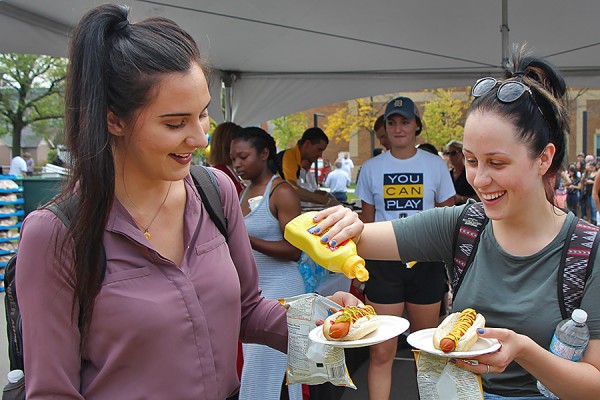 Allison Maitre gets a squirt of mustard from Larissa Howlett during the campus community barbecue, Thursday in the David A. Wilson Commons. Thousands of students, staff and faculty enjoyed the event, which served to dedicate Turtle Island Walk.
Allison Maitre gets a squirt of mustard from Larissa Howlett during the campus community barbecue, Thursday in the David A. Wilson Commons. Thousands of students, staff and faculty enjoyed the event, which served to dedicate Turtle Island Walk.
The University of Windsor officially opened Turtle Island Walk on Thursday, September 21. The pedestrian thoroughfare is named in recognition of the First Nations history of the land that the University campus sits on.
Many different First Nations groups have lived in the area, although it is the traditional territory of the Three Fires Confederacy — the alliance of the Anishinaabe people that includes the three nations of the Ojibwe, Odawa and Pottawatomi.
The turtle plays a significant part in Indigenous cultures. Many refer to North America as Turtle Island, and the turtle figures prominently in the Seven Teachings of the Ancestors — Wisdom, Love, Respect, Bravery, Honesty, Humility and Truth.
The Seven Teachings of the Ancestors are the universal values that guide the Anishinaabe in their daily living, their interactions with other people and with the natural environment. These teachings are displayed in a series of plaques along Turtle Island Walk.
The art featured on the banners that anchor the six prominent seating areas beside the walkway is the work of First Nations artist Teresa Altiman, who grew up on Walpole Island and draws inspiration from both the landscape and her Indigenous heritage. The banners are portions of a wall hanging commissioned by Parks Canada for display in the Visitors’ Centre at Point Pelee National Park.
“Turtle Island Walk is a celebration of First Nations people and cultures, and a landmark to their history and their future in our region”, said UWindsor president Alan Wildeman. “The Seven Teachings guide the ancestral inhabitants of this land, and they resonate with the aspirations of a university. I thank everyone who helped make Turtle Island Walk a reality.”
Turtle Island Walk was originally part of Sunset Avenue. The portion between University Avenue and Wyandotte Street was closed to vehicular traffic with the goal of transforming the street and nearby areas into a lively, public space that connects points of arrival, cross-campus pedestrian routes, and recreational activity.
Julie Sando, administrative assistant to the director of human rights, equity, and accessibility, won Monday’s trivia contest and the prize of a hoodie and some swag from the Aboriginal Education Centre.
Her entry was drawn from all those which correctly identified “to know your shared place within creation” as the northernmost podon Turtle Island Walk; Hurons as the European name for the Wyandots; Indians, Inuit, and Metis as the Aboriginal peoples of Canada; the muskrat as the most fearless animal; and Point Pelee National Park as the exhibitor of a work by artist Teresa Altiman.
See more photos from Thursday’s celebration on the UWindsor Facebook page.
